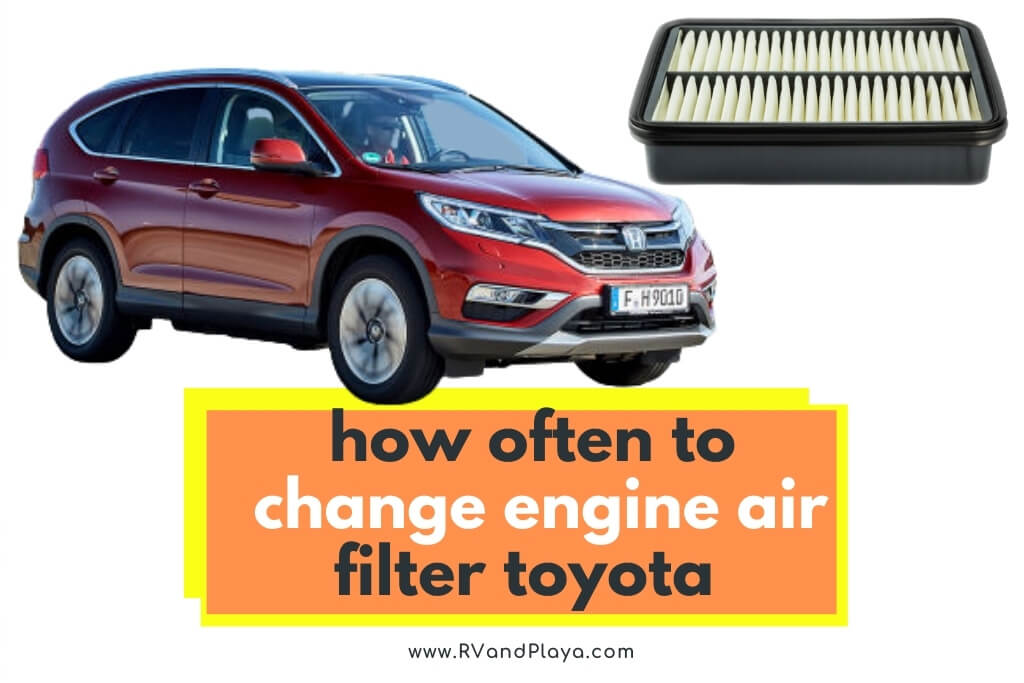Do you know what is the engine air filter frequency for Toyota? this is one of the questions our readers ask a lot. Well, we´ve got you covered.
The air filter for a Toyota engine is far more important than most people realize. The engine needs to always be at optimal working conditions and the combustion process requires a ton of oxygen. The engine’s air filter works to provide plenty of air, free of debris and potential abrasives.
So, how often do you need to change the engine air filter for your Toyota? On average the engine air filter frequency for all Toyota models like Toyota Camry, Toyota Corolla, Toyota CRV, Toyota Civic, and Toyota Prius is between 15,000 to 30,000 miles.
However, in many vehicles, there is no vehicle maintenance signal for when the air filter is compromised or dirty enough that it requires replacement.
So we’ve put together a quick guide with 5 examples of when to change your Toyota’s air filter and how often.
Table of Contents
1. Standard Change Every 10,000 to 15,000 Miles
With all things being equal—as in, you’re not having any other problems with the air filter and there’s no damage to the part—you’ll want to change the engine air filter every 10k to 15k miles.
That’s regardless of how well it looks. Many of the most expensive repairs in a vehicle could have been avoided with proper preventative maintenance.
That doesn’t mean you should always listen to that oil change fellow who insists that your air filter needs to be changed every time you show up because they found a leaf in it once.
However, it does pay off, in the long run, to change it when you reach the mileage requirements. Over time, an air filter becomes less and less efficient, even if it looks like everything is in order.
The good thing about Toyotas is that they are very well-put-together vehicles and have a long history of durability and efficiency despite neglect. Imagine how long it will last if you take care of the simple maintenance steps early on.
2. When You Notice There’s Less Power
We’re not talking about the battery when it comes to “less power.” You need three things to create the chain reaction known as combustion:
- Fuel: Delivered through the fuel injection system
- Spark: From the spark plugs during the ignition process
- Oxygen: Pulled through to the engine after it passes through the air filter
If your air filter isn’t at optimal capacity, the air pulled through can be partially blocked through dirt, dust, and/or debris build-up, depriving the engine of the oxygen it needs for proper combustion.
If you notice a loss of power, especially at high speed or during acceleration, one of the first places to look is at the air filter. If it’s no longer white or pale tan, it probably has collected a lot of dirt and needs to be changed.
Even if there’s no outward appearance of an obstruction, change it out anyway. It’s a cheap fix and you have nothing to lose by doing so.
Read also: How Often Should I Change Synthetic Oil For My Toyota
3. Ignition Problems: Slow Or Sluggish Start-Up
Like #2, the process of combustion comes into play here as well. As your Toyota’s air filter becomes more blocked, the ignition process may become sluggish as the fuel, air, and spark mixture aren’t equal.
There’s also a slow and steady chain reaction that begins with a dirty air filter. The emissions control system in your vehicle is also dependent on the amount of clean airflow passing through the air filter.
As emission controls become less adequate, other systems are affected as well. If your Toyota can’t properly clean and filter bad emissions through the catalytic converter, the bad deposits will stick to other parts, gumming up things such as the spark plugs.
When the spark plugs are no longer operating at optimal efficiency, it will also contribute to sluggish ignition problems.
It could also become a problem for the catalytic converter, as it may not be able to clean the pollutants coming through the air filter on top of what it has to do under normal conditions.
Unfortunately, catalytic converters can be an expensive repair or replacement job, so you don’t want it to get that far.
4. Smoke And Popping Sounds From The Exhaust
If this happens, it’s because the Toyota’s air filter has been neglected for quite some time and, not only is the passage through the air filter no longer efficient, it has become so clogged that the air, fuel, and spark mixture is way off.
As a result, fuel that hasn’t been ignited from the poor combustion process can make its way into the exhaust system, where the tail pipe’s heat will ignite it, belching black smoke and sometimes flame from the back end.
At this point, it’s bad enough to take it to a mechanic, because even a clean air filter replacement may not be enough to restore the combustion process to nominal levels.
Remember the chain reaction results from #3? Well, this happens when multiple systems are affected and it’s necessary to have the vehicle inspected and a proper tune-up applied.
If the tailpipe is spitting flames and black smoke, you can rest assured that the air filter, spark plugs, fuel injection system, and catalytic converter will all need to be evaluated. Hopefully, the damage doesn’t extend deeper if the Toyota’s air filter is allowed to reach this point.
5. Decreased Fuel Mileage
If the ignition system is problematic, the combustion cycle that occurs within the engine will be problematic as well. With decreased combustion capacity the gas mileage your Toyota is no longer getting is noticeable.
Frequent commutes, typical daily drives, and anything else you do, you will notice you’re stopping more frequently for gas.
If you notice a reduction in miles per gallon, the first thing to check is the engine’s air filter and work your way down from there. Non-mechanics don’t concern themselves with the air filter because most people do not realize how crucial it is.
As the airflow becomes dirty and the oxygen level decreases, your engine has to work harder. As a result, it gobbles up more fuel and it’s usually noticeable in the pocketbook before anything else.
Even if the air filter isn’t the only culprit that’s reducing the mileage and fuel efficiency of your Toyota, replacing it will improve the condition.
Whenever there’s a problem with gas mileage, you should change the air filter as a simple matter of routine.
Here are some of my favorite tools & equipment´s
Thank you for reading this article. I hope it helps you find the most recent and accurate technical and repair information for your car. Here are some tools that I use as an automotive technician and hope you´ll also find helpful.
There are affiliate links, so if you do decide to use any of them, I´ll earn a small commission. But in all honesty, these are the exact tools that I use and recommend to everyone, even my own family. (NO CRAP)
To see all my of most up-to-date recommendations, check out this resource that I made for you!
References
https://blog.rainbowmuffler.net/blog/is-it-time-to-change-your-cars-engine-air-filter
Recent Posts
How Much Does It Cost To Install A Trailer Hitch On A Toyota Highlander?
Are you wondering how much does it cost to install a trailer hitch on a Toyota Highlander? Whether you want to go camping or just pull something with your Toyota Highlander, you will need a hitch...
The Toyota Tacoma is easily one of the most popular trucks in the United States. There are a variety of different reasons for this, some of which are going to be covered on this page. Due to the...


